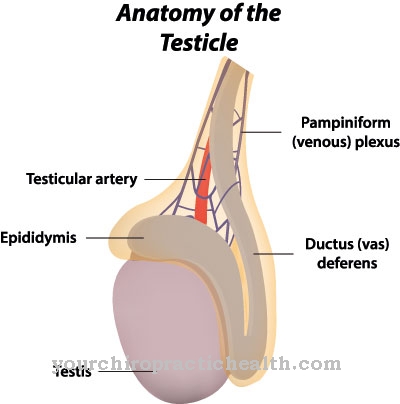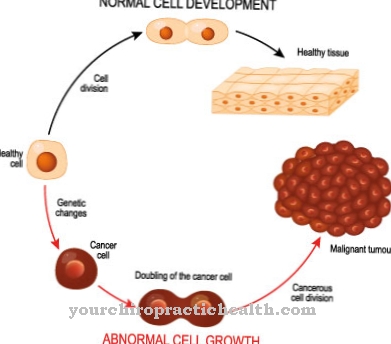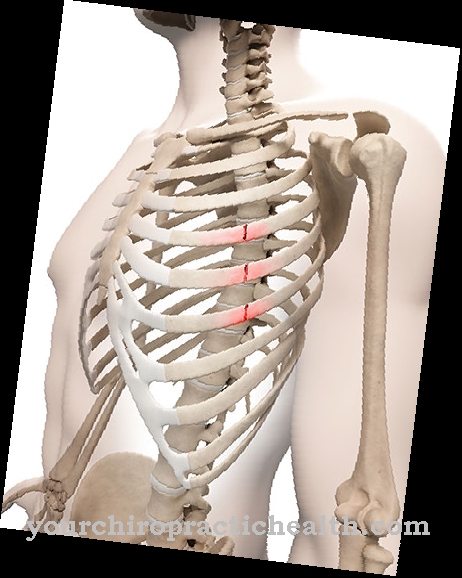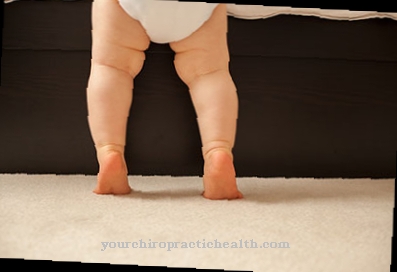In the Cheilitis it is an inflammatory disease of various possible forms. Therapy usually includes treating the cause.
What is cheilitis?

© M.Dörr & M.Frommherz - stock.adobe.com
Cheilitis is an inflammation that affects the lips. In medicine, different forms of cheilitis are distinguished. These forms include, for example, so-called cheilitis simplex (the most common form of inflammation) and angular cheilitis. In the latter, the corners of the mouth are affected by inflammation. Cheilitis can appear as an independent disease or as a symptom of other diseases.
The symptoms of cheilitis can be many; For example, those affected often experience redness and swelling of the lip. Corresponding swellings can be accompanied by flaking and / or painful tears on the lip. Occasionally, as part of cheilitis, blisters or so-called ulcerations - i.e. defects in the skin and mucous membrane that extend into deep skin layers - appear.
causes
Cheilitis can have various causes. Initially, the inflammation of the lip can be caused by allergic reactions, for example to food or cosmetics.
Infections with pathogens such as viruses, bacteria or fungi can also result in cheilitis. If cheilitis is caused by deficiency symptoms, it is usually an iron deficiency. Various active ingredients in medicines also occasionally cause cheilitis.
Another factor that can favor inflammatory disease on the lip is exposure to strong light; Especially UV radiation can damage the lip. Last but not least, various tissue changes can be concealed behind a cheilitis. Possible tissue changes include, for example, tumors (swellings) or so-called precancerous lesions (precursors of cancer).
Symptoms, ailments & signs
As a rule, very unpleasant symptoms arise with cheilitis. Those affected suffer from severe inflammation, which occurs primarily on the lips, but can also spread to the affected person's face. The lips are reddened and appear brittle or cracked.
In many cases, the cheilitis will also have a negative impact on the aesthetics of the person affected and can significantly reduce it. Many patients therefore also suffer from depression and other psychological disorders. Small blisters can also develop on the lips, which are often associated with severe pain. If the cheilitis occurs as a result of an allergy, the patients usually suffer from the other symptoms of this allergic reaction.
Furthermore, there can be a deficiency of iron in cheilitis. The severity of the symptoms in this disease can be very different and does not always have to restrict the everyday life of the person affected. Cheilitis can be treated relatively easily, with no particular complications or other complaints. Applying creams or ointments directly alleviates the symptoms.
Diagnosis & course
Diagnosing the cause of existing cheilitis usually begins with a patient interview, in which the person concerned provides information on points such as the beginning and previous duration of the inflammation. In combination with factors from a patient's recent medical history, this can give the treating doctor initial indications of the causes.
For example, if there is a suspicion that cheilitis was caused by pathogens, this can be checked with a smear on the affected tissue. Various pathogens can also be identified on the basis of a stool sample. Allergy tests can indicate cheilitis as a possible allergic reaction. An existing iron deficiency as the cause of cheilitis can be checked by a blood test.
The course of cheilitis depends, among other things, on the causes of the inflammation and the medical measures taking place. If the cause of a cheilitis can be clearly determined, the inflammation can be combated successfully in many cases.
When should you go to the doctor?
Changes in the skin on the lips that do not go away after a week at the latest should be examined by a doctor and treated if necessary. If symptoms such as chapped or burning lips as well as lumps or swelling at the corners of the mouth develop, an immediate investigation is indicated. This is especially true if the symptoms cause problems with speaking or eating. Allergy sufferers, especially those with allergies to certain foods or cosmetics, should see their doctor with the symptoms mentioned.
If the disease is left untreated, in the worst case scenario it can cause permanent tissue damage. In addition, the difficult food intake can lead to undersupply and dehydration. Therefore: see a doctor at the first signs of inflammation. He can determine whether there is cheilitis and then suggest a suitable therapy. Sometimes it is enough to change your lifestyle and ensure a healthy diet and sufficient exercise. However, cheilitis can also have serious causes that cannot be treated without medical help.
Doctors & therapists in your area
Treatment & Therapy
Therapeutic steps in the treatment of cheilitis are primarily based on the causes of the inflammatory disease. If, for example, the cheilitis is caused by an allergy to certain foods, the attending physician usually recommends a change in diet, in which appropriate components should be largely avoided.
A change in diet often makes sense even if cheilitis is caused by an iron deficiency; If an existing iron deficiency cannot be adequately compensated for through food intake in individual cases, the administration of food supplements can be useful.
If infections have led to cheilitis, the corresponding pathogens are usually controlled in a targeted manner. If, for example, bacteria are responsible for a corresponding infection, such control can be done by applying antibiotic ointments locally.
If certain medications have led to the occurrence of cheilitis, the attending physician will often change the medication. If, in the end, tissue changes are the cause of a cheilitis in a patient, then depending on the medical assessment it can be useful, for example, to surgically remove the corresponding changes.
Outlook & forecast
The prognosis for cheilitis is favorable. Patients with a healthy and stable immune system experience an alleviation of the symptoms a few days after drug treatment and then the disease is cured. If there are no sequelae, the patient is cured and released from therapy in a short time.
In some cases, the cracks in the skin cause further discomfort to the skin or the penetration of additional pathogens. The good prognosis changes dramatically as soon as blood poisoning occurs. In these situations there is a mortal danger for the patient that requires immediate action.
The cause of the cheilitis must be diagnosed and treated to ensure that the symptoms remain free. An insufficient supply of the organism can be treated and treated well. If there is an allergic reaction, the patient must permanently avoid the triggering stimulus. A change in food intake often leads to recovery.
If the patient has an infection or other inflammation, it must be treated. The cheilitis can then also heal. The more weakened the person is and the more intense the underlying disease, the less favorable the prognosis. In the worst case, surgery is performed to remove the cheilitis. This treatment route is usually chosen for a tissue disease.
prevention
Since the possible causes of cheilitis are very diverse, comprehensive prevention is difficult. However, the risk of cheilitis can be reduced, for example, by avoiding / combating food-related deficiency symptoms. Strengthening the body's immune system also helps to avoid infections with pathogens that can subsequently cause cheilitis.
Aftercare
In most cases of cheilitis, the patient has only a few direct follow-up measures available. The further course of the disease depends very much on the exact cause of the disease, so that primarily the underlying disease must be treated. The affected person should consult a doctor at the first signs of cheilitis in order to prevent further complications and complaints, as this cannot lead to self-healing.
Treatment is usually carried out by taking medication. The patient should always pay attention to regular intake and also to the correct dosage of the medication in order to properly alleviate the symptoms. In some cases, the diet must also be changed, whereby the doctor can also create a nutrition plan.
Furthermore, a healthy lifestyle with a balanced diet also has a positive effect on the course of cheilitis. In some cases, surgical interventions are also necessary, but no special follow-up care is required. Whether the cheilitis leads to a reduced life expectancy of the patient cannot be universally predicted.
You can do that yourself
What the patient can do about a lip infection depends on what triggers it. In the case of systemic causes such as diabetes mellitus, immune deficiency or an insufficient supply of iron, the best means of self-help is regularly to change your lifestyle. Obesity, an unhealthy diet, little sleep and excessive consumption of alcohol and nicotine are counterproductive.
On the other hand, a diet rich in vitamins and fiber, avoiding meat and sausage products and ready-made products as well as regular exercise in the fresh air are beneficial. In the case of a severe deficiency of iron, the intake of food supplements is indicated.
If the cheilitis is an allergic reaction, the triggers must be identified and avoided. Fruit, especially conventionally grown fruit, should always be washed well and ideally peeled, as the pesticides used in agriculture are often responsible for allergic reactions in and on the mouth.
Inflammation of the lips can also be caused by UV rays. In these cases, the lips must be treated with a sunscreen. For this purpose, lip balm sticks with a sun protection factor are available in stores.
Blisters and ulcers, regardless of what caused the disorder, should be swabbed regularly with alcohol to prevent secondary infections. The same applies to angular cheilitis. These can be treated very well with medicinal zinc ointment from the pharmacy or drugstore.



.jpg)




















.jpg)



